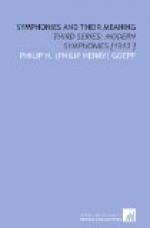But the long association with the German people has nearly worn away the racial signs and hall-marks of its folk-song. A Bohemian tune thus has a taste much like the native German. Yet a quality of its own lies in the emotional vitality, shown in a school of national drama and, of late, in symphony. It is not necessary to seek in this modern culmination a correspondence with an impending danger of political suppression. Art does not follow history with so instant a reflection.
The intensity of this national feeling appears when Smetana himself, the minstrel of the people, is charged at home with yielding to the foreign influence. Here again is the hardship of the true national poet who feels that for the best utterance of his message he needs the grounding upon a broader art; here is the narrow Chauvinism that has confined the music of many lands within the primitive forms.
Two types we have in Bohemian music of later times: one, Smetana, of pure national celebration; a second, Dvorak, who with a profound absorption of the German masters, never escaped the thrall of the folk-element and theme.
SMETANA. SYMPHONIC POEM, “THE MOLDAU RIVER"[A]
[Footnote A: Friedrich Smetana, 1824-1884, foremost among Bohemian dramatic composers, wrote a cycle of symphonic poems under the general title “My Country.” Of these the present work is the second.]
Simplicity is uppermost in these scores; yet the true essence is almost hidden to the mere reader. With all primitive quality they are more difficult than many a classic symphony. The latent charm of folk humor and sentiment depends more on tradition and sympathy than on notation.
The naively graphic impulse (that we find throughout the choral works of Bach) that merely starts a chance themal line, as here of the first branch of the Moldau, does not disturb the emotional expression. And while the feeling is sustained, the art is there, not to stifle but to utter and set free the native spring of song.
It must be yielded that the design is not profound; it smacks of the village fair rather than of grand tragedy. Song is ever supreme, and with all abundance of contrapuntal art does not become sophisticated. The charm is not of complexity, but of a more child-like, sensuous kind.
It must all be approached in a different way from other symphonic music. The minstrel is not even the peasant in court costume, as Dvorak once was called. He is the peasant in his own village dress, resplendent with color and proud of his rank.




